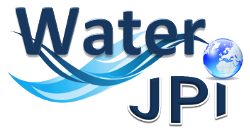Newsletter 3 - 2024
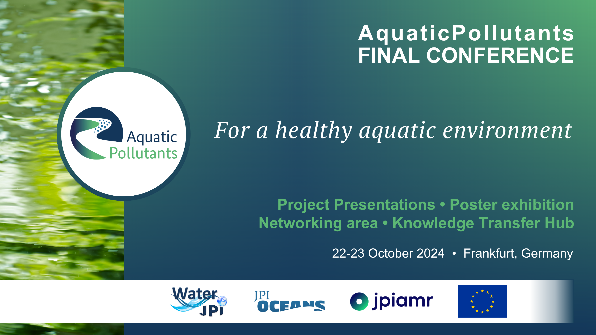
Invitation to the AquaticPollutants Final Conference
The AquaticPollutants Final Conference will showcase the findings of 18 funded research projects focused on pollutants such as contaminants of emerging concern (CECs), antibiotics, microorganisms, and antibiotic-resistant bacteria and their ...
The AquaticPollutants Final Conference will showcase the findings of 18 funded research projects focused on pollutants such as contaminants of emerging concern (CECs), antibiotics, microorganisms, and antibiotic-resistant bacteria and their resistance genes. After three years of transdisciplinary research, these projects will present their results centered on key themes: measuring, evaluating, and taking action against water pollution.
The conference will emphasize application-relevant topics, featuring presentations from the AquaticPollutants transfer project and the winning team of the Innovation Challenge. Participants can also engage in a "knowledge transfer" networking area and attend a policy-oriented panel discussion.
This two-day event invites participants from industry, government, academia, and federal and state authorities to explore how the research findings from this ERA-NET Cofund can be effectively translated into practice. Join us in Frankfurt to contribute to important discussions on the future of water quality and public health.
The conference will feature presentations and panel discussions on key topics and also poster exhibitions, networking area and a knowledge transfer hub.
We look forward to welcoming you to Frankfurt for an enriching and impactful experience.
Register here: https://dechema.de/en/AquaticPollutants.html
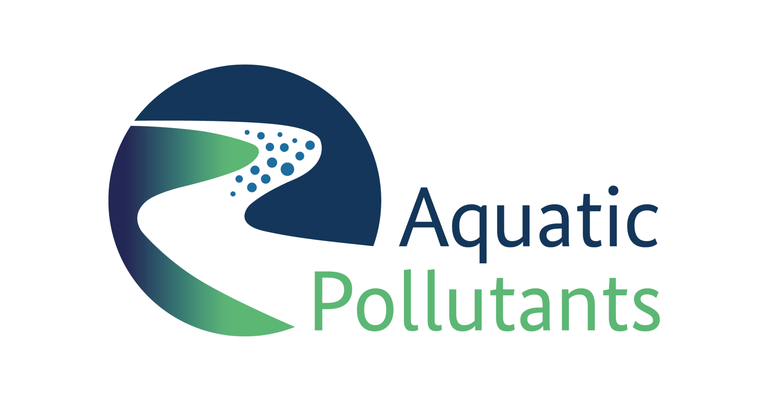
AquaticPollutants Session at World Water Week 2024
On 28 August 2024, AquaticPollutants took part in the World Water Week in Stockholm with an online session: "Safe Water - Addressing Challenges to Mitigate Stubborn Chemicals, Antimicrobial Resistance". Did you miss it? Here’s a quick recap!
Lars Österlund (GreenWaterTech) and Nanette Zahrtmann (NanoTheC-Aba) emphasized the urgency in tackling AquaticPollutants: “We're far from achieving SDG 6, especially Target 6.3. According to the UN's August 2024 report, 42% of household and 73% of ...
Lars Österlund (GreenWaterTech) and Nanette Zahrtmann (NanoTheC-Aba) emphasized the urgency in tackling AquaticPollutants: “We're far from achieving SDG 6, especially Target 6.3. According to the UN's August 2024 report, 42% of household and 73% of industrial wastewater isn't safely treated.” They also said that contaminants of emerging concern (CECs) like PFAS, microplastics, and nanomaterials remain a challenge: “We need better risk assessment and advanced treatments at WWTPs and point sources.”
Paola Verlicchi (SERPIC) highlighted new technologies from AquaticPollutants projects that target persistent contaminants across wastewater types.
Marcus Grünerwald (GreenWaterTech) noted that these technologies need more development and stakeholder collaboration —including with regulators and civil society— to reach TRL 9 and be implemented in communities.
Jan Gäbler (SERPIC) and Henrik Rasmus Andersen (PRESAGE) shared some important insights on working with end-users as researchers.
After the presentations, there was time for a Q&A. One of the findings here was that AquaticPollutants researchers can guide policy on hard-to-remove CECs. Further, Víctor Matamoros (NATURE) proposed nature-based solutions for cost-effective treatment in low- and middle-income countries. Another focus was that the next generation of engineers and scientists must also master social science skills to communicate solutions effectively, as Ani Vardanyan advised: "Learn by doing" —through conferences, presentations, and moderation.
Thanks to all speakers and the more than 50 participants who joined us!

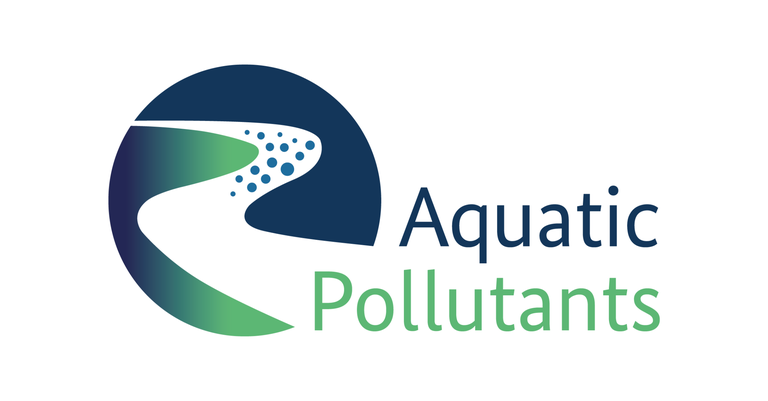
AquaticPollutants RoadShow: Amplifying Research Development and Innovation Amongst Partner Countries
The South African Water Research Commission convened a virtual roadshow with partners in the ERA-NET CoFund AquaticPollutants consortium during Stockholm World Water Week held on the 28th August 2024. The roadshow addressed how research among ...
The South African Water Research Commission convened a virtual roadshow with partners in the ERA-NET CoFund AquaticPollutants consortium during Stockholm World Water Week held on the 28th August 2024. The roadshow addressed how research among African partners is solving challenges on the continent related to the pollution of rivers, estuaries and coastal ecosystems by contaminants of emerging concern (CECs). CECs include chemicals, antibiotics as well as well as microorganisms, which originate from consumer waste products, agriculture, animal husbandry farms, industry, and maritime activities. International project cooperation is important to strengthen and build resilience in the global water research, development and innovation sector, considering the impacts of climate change, urbanization and rapid population growth, and risks to energy and food security.
Two core themes were central to the session: assessment and surveillance of emerging pathogens and antibiotic resistance in water ecosystems and their influence on livestock and aquatic wildlife; and innovative technologies to reduce emerging pollutants in natural-based water treatment systems, given the health risks that pathogens in wastewater treatment plants effluent pose.
Driven through the four AquaticPollutants projects;
- DisPersal of antIbiotic resistance and antibiotics in Water ecosystems and Influence on liveStock and aquatic wildlife (PAIRWISE)
- Reduction and assessment of antimicrobial resistance and Emerging pollutants in natural-based water treatment systems (REWA)
- Surveillance of Emerging Pathogens and Antibiotic Resistances in Aquatic Ecosystems (SARA)
- Sustainable Electrochemical Reduction of contaminants of emerging concern and Pathogens in WWTP effluent for Irrigation of Crops (SERPIC)
Presentations from project leaders at Makerere University in Uganda, Eduardo Mondlane University in Mozambique, University of KwaZulu Natal and Stellenbosch University in South Africa were followed by a Q&A and input from participants.
Highlights from the presentations included results from a surveillance study showing the spread of antimicrobial resistance (AMR) in human- livestock- environment and wildlife interfaces in Uganda, and the presence of antibiotic resistant pathogens in samples collected from rivers, boreholes, surface water wells and conventional drinking water distribution systems in Mozambique. These findings punctuate that the spread of AMR is a global concern and necessary to develop novel surveillance tools to facilitate the identification of hotspots to mitigate the spread of AMR in low-and middle-income countries using a one-health approach as well as amplifying research impact through community awareness campaigns.
The development of promising new sustainable and cost-effective nature-based technologies for the removal of CECs in sewage effluents were also highlighted. Important future considerations should involve the scaling-up of these innovations and ensuring that they are adaptable for implementation to the local context and conditions of different regions in Africa.
Another highlight was a caution that quantification of CECs in end product water by itself is not sufficient to determine the health risk of water, as studies have shown the presence of CECs and more specifically endocrine disruptors in river systems upstream and downstream from waste water treatment plants and in ground water sources where this water is utilised in agriculture. This is concerning, as uptake of these pollutants in plants may pose significant health risks and suggests that treatment may lead to breakdown products with even higher toxicity risk and endocrine disrupting potential. Water utilized for crop production or livestock should therefore be more strictly monitored and future policy recommendations on CEC guidelines should include bioanalytical tools for effect-based monitoring and effect-directed analysis.
The session also identified that a significant gap in aquatic pollutants research in Africa is funding for risk-based monitoring of water sources and establishment of monitoring tools and applications, which could serve as an early warning system in case of pollution episodes.
The session concluded with a poignant reminder of the centrality of water in achieving all 17 SDGs. AquaticPollutants research findings can be translated to policy recommendations to support enhanced policy coordination and address water inequities through sustainable water governance.
A final roadshow to disseminate the impact of the AquaticPollutants will be held in conjunction with the 14th IWA International Conference on Water reclamation and reuse in March 2025 in Cape Town South Africa.
Roadshow programme (.pdf)
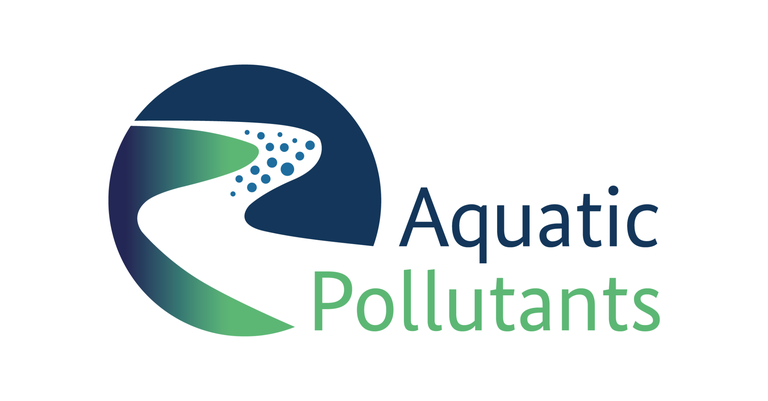
Fostering Collaboration and Innovation: Highlights from the ERA NET Aquatic Pollutants PhD Forum
The ERA NET in Aquatic Pollutants PhD Forum has successfully fostered a collaborative environment for early-career researchers, featuring a series of engaging activities designed to enhance knowledge and skills in this critical field.
Over the ...
The ERA NET in Aquatic Pollutants PhD Forum has successfully fostered a collaborative environment for early-career researchers, featuring a series of engaging activities designed to enhance knowledge and skills in this critical field.
Over the course of the forum, participants had the opportunity to attend 12 webinars covering a range of topics specific to the professional realm of aquatic pollutants. These sessions also included valuable insights into broader subjects such as submitting for professional grants and developing essential soft skills. The diverse curriculum aimed to equip participants with the tools necessary for success in their research and career paths.
A highlight of the forum was the Scientific Poster Award competition held during the midterm meeting in Madrid. This event showcased the innovative research being conducted by PhD candidates in the field. The winner, Naomi Massaccesi from the Italian National Research Council (CNR), was recognized for her outstanding poster on work conducted within the ARENA project. Her achievement not only underscores the quality of research emerging from this forum but also encourages ongoing engagement and excellence among participants.
Additionally, all webinars and activities were published on the dedicated PhD forum page on LinkedIn, providing a platform for ongoing engagement and knowledge sharing. To ensure accessibility for those who could not participate live, all webinars are also available on our YouTube channel, allowing everyone to catch up on the valuable content shared.
Overall, the ERA NET in Aquatic Pollutants PhD Forum has provided a valuable platform for learning, networking, and recognition, contributing significantly to the advancement of knowledge in the field of aquatic pollutants.
LinkedIn profile: https://www.linkedin.com/company/aquatic-pollutants-phd-forum/posts/?feedView=all
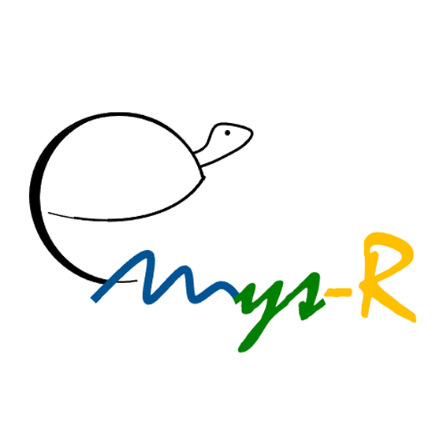
Exciting New Publication from the Emys-R Project
We are pleased to share that the Emys-R project, funded by the ERA-NET Cofund BiodivRestore, has achieved another significant milestone with the publication of its latest research in the renowned journal Scientific Reports - Nature: Present and ...
We are pleased to share that the Emys-R project, funded by the ERA-NET Cofund BiodivRestore, has achieved another significant milestone with the publication of its latest research in the renowned journal Scientific Reports - Nature: Present and future distribution of the European pond turtle versus seven exotic freshwater turtles, with a focus on Eastern Europe by Nekrasova et al. (2024).
In this groundbreaking study, led by Oksana Nekrasova and her colleagues, bioclimatic models were developed to analyze the future distribution of the native European pond turtle Emys compared to seven exotic species that have established themselves in Europe. Their findings underscore the importance of Eastern Europe, particularly Ukraine, as key conservation areas where competition risks for the native Emys will remain limited by 2050.
This publication is a major achievement for Emys-R and contributes to one of the project’s long-term conservation goals. It also highlights our support for Ukraine’s integration into Europe, with special recognition for Oksana Nekrasova, a Ukrainian scientist who joined the project through a PAUSE fellowship, awarded by Collège de France-ANR, extended until 2025.
For more details on this and other publications, please visit Emys-R Publications.

Ursula von der Leyen's 2024-2029 Political Agenda: Strengthening European Competitiveness, Sustainability, and Water Resilience
Re-elected at the head of the European Commission, Ursula von der Leyen's 2024-2029 political guidance outlines key priorities for the European Commission, building on her first term while introducing new initiatives to address emerging ...
Re-elected at the head of the European Commission, Ursula von der Leyen's 2024-2029 political guidance outlines key priorities for the European Commission, building on her first term while introducing new initiatives to address emerging challenges.
One of her primary goals is to strengthen European competitiveness by ensuring a strong, business-friendly single market. This will involve a new Clean Industrial Deal, which focuses on access to sustainable, secure, and affordable energy, as well as the promotion of decarbonization to address the accelerating climate crisis. Von der Leyen is also emphasizing the importance of the circular economy, proposing a Circular Economy Act aimed at fostering demand for secondary raw materials and creating a unified market for waste across the EU. Her political guidance also includes measures for advancing digital technology, particularly in artificial intelligence and data, with the goal of making Europe more competitive on the global stage.
Water is also listed as a priority in the political guidance, which declares the need for a European Strategy for Water Resilience for a proper management of water sources. The need for data, the protection of wetlands and the mapping of water-related challenges in both cities and rural areas are included as key action priority areas.
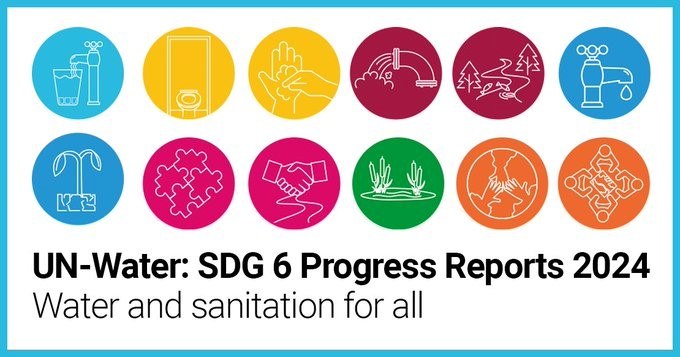
Sustainable Development Goal 6 on water and sanitation (SDG 6) Progress Reports
Progress reports are critical tools in our work to achieve SDG 6. High-quality data helps policy-and decision-makers identify challenges and opportunities, set priorities for more effective and efficient implementation, communicate progress and ...
Progress reports are critical tools in our work to achieve SDG 6. High-quality data helps policy-and decision-makers identify challenges and opportunities, set priorities for more effective and efficient implementation, communicate progress and ensure accountability, and generate political, public and private sector support for further investment.
Here you’ll find the available progress updates on all SDG 6 global indicators, as well as synthesized analysis of overall progress and acceleration needs to achieve SDG 6 by 2030. The reports are primarily based on official national data sources.
Progress reports on specific SDG 6 indicators are produced by the respective UN custodian agencies, on behalf of and in affiliation with UN-Water and as part of the work of the Integrated Monitoring Initiative for SDG 6 (IMI-SDG6). This includes the reports from the WHO/UNICEF Joint Monitoring Programme for Water Supply, Sanitation and Hygiene (JMP) and the UN-Water Global Analysis and Assessment of Sanitation and Drinking-Water (GLAAS).
Synthesis reports and summary updates are produced by UN-Water to provide executive updates on progress towards all of SDG 6 and identify priority areas for acceleration, in support of global policy processes.
The progress reports :
Progress on Water-related Ecosystems – 2024 Update : https://www.unwater.org/publications/progress-water-related-ecosystems-2024-update
Progress on Implementation of Integrated Water Resources Management – 2024 Update : https://www.unwater.org/publications/progress-implementation-integrated-water-resources-management-2024-update
Progress on Ambient Water Quality – 2024 Update : https://www.unwater.org/publications/progress-ambient-water-quality-2024-update
Progress on Wastewater Treatment – 2024 Update : https://www.unwater.org/publications/progress-wastewater-treatment-2024-update
Summary Brief: Mid-term status of SDG 6 global indicators and acceleration needs : https://www.unwater.org/publications/summary-brief-mid-term-status-sdg-6-global-indicators-and-acceleration-needs
Explore overall progress towards SDG 6 at global, regional and national levels here: www.sdg6data.org.
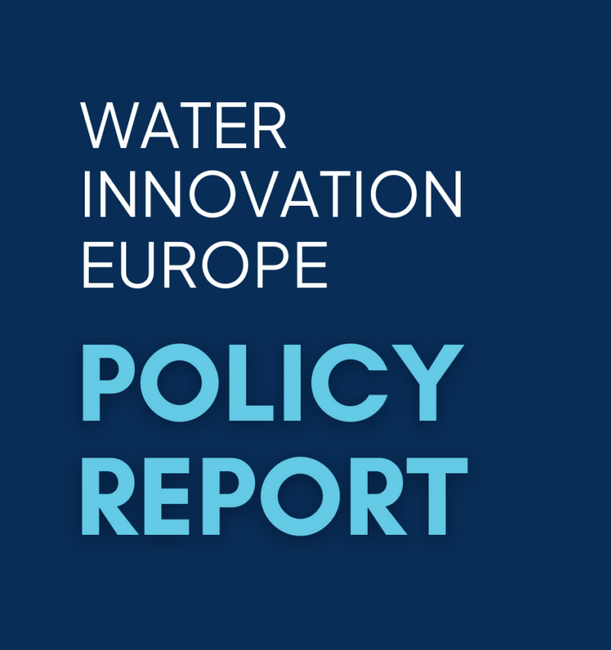
Water Innovation Europe Policy Report 2024
Water Europe has now published its new policy report on the Water Innovation Europe 2024 conference, which took place on June 17-19 in Brussels, attracting over 300 attendees who joined forces to shed light on a European Water-Smart Strategy.
The ...
Water Europe has now published its new policy report on the Water Innovation Europe 2024 conference, which took place on June 17-19 in Brussels, attracting over 300 attendees who joined forces to shed light on a European Water-Smart Strategy.
The Water Innovation Europe 2024 policy report summarizes the multi-stakeholder discussions held during the main sessions, emphasizing the need for a European Water-Smart strategy to secure and sustain water sources in Europe and beyond.
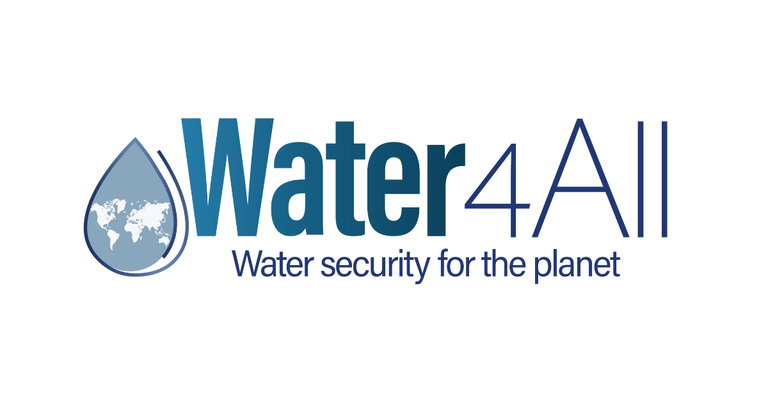
Water4All 2024 Joint Transnational Call / Water for Circular Economy
Pre-Proposal submission deadline: 13 November 2024
In collaboration with the European Union, 36 Funding Agencies from all over Europe and abroad are pleased to announce the Joint Transnational Call for research and innovation projects on “Water for Circular Economy”.
The Joint Transnational Call ...
In collaboration with the European Union, 36 Funding Agencies from all over Europe and abroad are pleased to announce the Joint Transnational Call for research and innovation projects on “Water for Circular Economy”.
The Joint Transnational Call (JTC) is launched in the framework of the European partnership Water4All and supports research and innovation projects to improve water security in the long term. In line with the strategic objectives of Water4All, the results should contribute to the implementation of evidence-based, global, EU and national water management policies and strategies, within the frameworks of the Green Deal, Water Framework Directive, Just Transition and the Water Action Agenda for UN Sustainable Development Goals. Proposals should show cognisance of appropriate legislation and policy frameworks at national and international levels while addressing policy actions and steering mechanisms needed to foster the paradigm shift to Circular Economy.
The context for the general call topics is described in Theme I of the Water4All Strategic Research and Innovation Agenda (SRIA), “Water for Circular Economy: smart water value”. Likewise, Themes VI and VII in the SRIA on “International cooperation” and “Governance”, respectively, must be considered as they are cross-cutting issues to all other themes. Applicants are encouraged to check links in the SRIA between themes.
Pre-Proposal submission deadline: 13 November 2024
https://www.water4all-partnership.eu/joint-activities/water4all-2024-joint-transnational-call
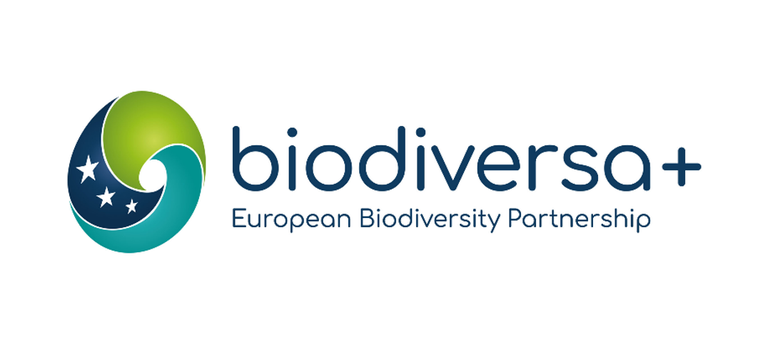
Biodiversa 2024-2025 Joint Call: Biodiversity and Transformative Change
Pre-Proposal submission deadline: 08 November 2024
The BiodivTransform Call aims to support interdisciplinary, transdisciplinary, and/or cross-sectoral research and innovation projects that will:
Help understand trade-offs and cross-linkages between the worldwide crises of biodiversity loss, ...
The BiodivTransform Call aims to support interdisciplinary, transdisciplinary, and/or cross-sectoral research and innovation projects that will:
Help understand trade-offs and cross-linkages between the worldwide crises of biodiversity loss, climate change and pollution;
- Identify, analyse, and comprehend transformation processes that may safeguard biodiversity by mitigating its threats and halt – even reverse – its decline, as well as the benefits it may provide to people.
This call adopts a bottom-up approach and intentionally does not define research themes.
Projects will be expected to demonstrate academic excellence with potential for societal and policy impact regarding biodiversity, aiming to connect science, society, policy, and practices for transformative change.
This call is not restricted in terms of specific environments nor geographic areas, encompassing all realms (terrestrial, marine, coastal and freshwater) and ecosystems experiencing various levels and sources of disturbances, including transition zones and interfaces (coastal, wetlands, urban–rural, forest–agriculture, etc.) and in integrated land/seascapes.
Applicants must carefully read the announcement of opportunity (Call Document 1) that further details the scope of the call.
Pre-Proposal submission deadline: 08 November 2024
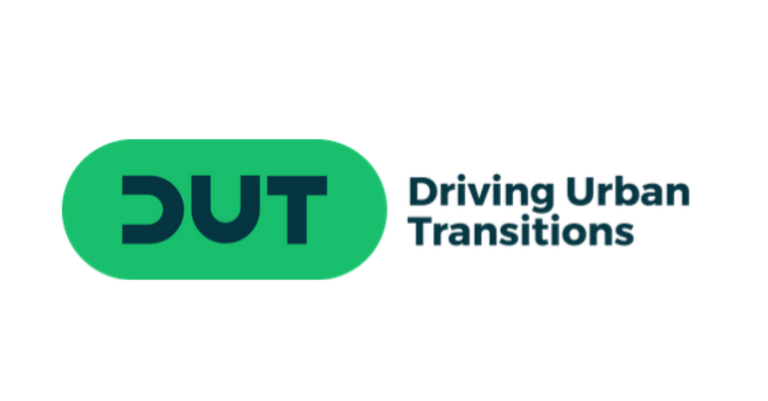
DUT Call 2024
Pre-Proposal submission deadline: 14 November 2024
The purpose of this Call for proposals is to support transnational research and/or innovation projects addressing urban challenges to help cities in their transition towards a more sustainable economy and functioning. The challenges are grouped into ...
The purpose of this Call for proposals is to support transnational research and/or innovation projects addressing urban challenges to help cities in their transition towards a more sustainable economy and functioning. The challenges are grouped into three themes called ‘Transition Pathways’: Circular Urban Economies, 15-minute City and Positive Energy Districts.
This is the third Call of the Driving Urban Transitions (DUT) Partnership, funded by the European Commission under the Horizon Europe Partnership scheme.
On a global level, DUT Call 2024 is part of the Mission Innovation (MI) call series, i.e., MICall24. As such, call topics are prepared in collaboration with the Urban Transitions Mission (UTM) under MI, and all topics of the Call are open for applications that directly and/or indirectly contribute to the work of UTM. JPI Urban Europe, a co-lead of the UTM, is contributing to UTM activities through its current R&I programme, the DUT Partnership, including the PED sprint implementation. In addition, the DUT Call 2024 will also be implemented in cooperation with selected Members of the Belmont Forum, which will participate in the Call as individual Funding Agencies and thus enable further international partners to join DUT projects.
Pre-Proposal submission deadline: 14 November 2024
https://dutpartnership.eu/dut-call-2024/
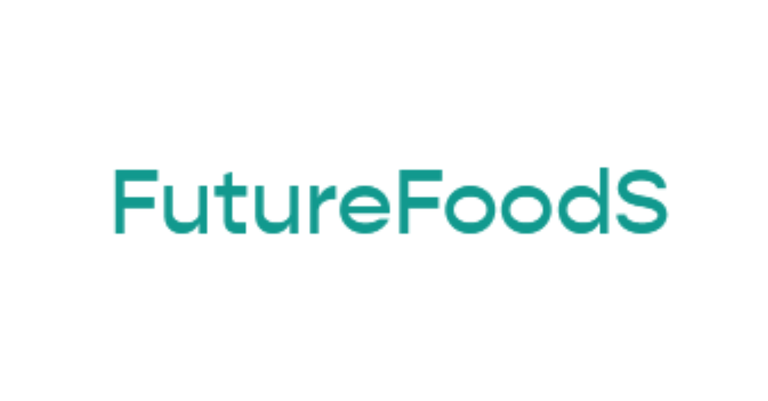
FutureFoodS 1st co-funded call for transnational research projects
Pre-Proposal submission deadline: end of December 2024/early January 2025
FutureFoodS will soon launch the first co-funded call for transnational research projects, with the expected opening at the end of October 2024. This call offers funding for innovative projects that contribute to one of the following topics:
...
FutureFoodS will soon launch the first co-funded call for transnational research projects, with the expected opening at the end of October 2024. This call offers funding for innovative projects that contribute to one of the following topics:
- Topic 1: The way towards sustainable and resilient food systems
- Topic 2: New foods – Fostering innovations in food design, processing and supply via demand and supply reorientation
- Topic 3: Empowering sustainable food choices – Enabling environments and dietary shifts
Pre-Proposal submission deadline: end of December 2024/early January 2025
https://www.futurefoodspartnership.eu/funding-opportunities
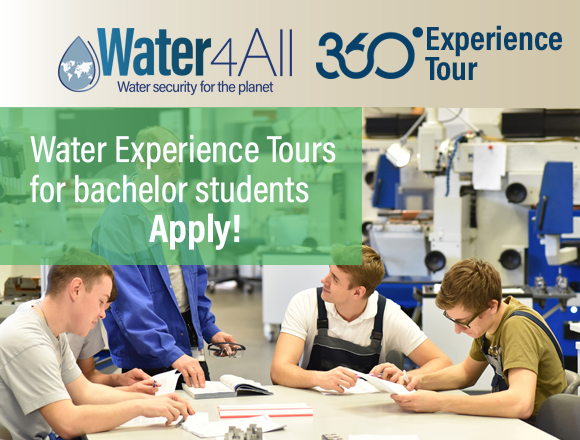
Vocational Training – Water4All 360° Tour 2025-2026, an immersive water program
Water4All offers a unique experience for bachelor students across Europe, an exciting opportunity to explore cutting-edge water technology, sustainability practices, and innovative solutions in the water sector.
Through hands-on experiences, ...
Water4All offers a unique experience for bachelor students across Europe, an exciting opportunity to explore cutting-edge water technology, sustainability practices, and innovative solutions in the water sector.
Through hands-on experiences, educational workshops, and interactive tours of leading water facilities, students will gain valuable insights into the challenges and opportunities within the industry.
What is this vocational training for?
The 360° Tour aims to inspire the next generation of water professionals by connecting them with experts, fostering collaboration, and encouraging careers focused on water sustainability.
Five sessions across Europe (Netherlands, Czech Republic, Portugal) are scheduled: from March 2025 to August 2026. Each session lasts five days.
First session in the Netherlands, March 2025
- The first tour “Smart Water Value”: from 17 to 21 March 2025 in the Netherlands
- The first session is open to applicants until November 18, 2024 (link to apply 360 Watertech Experience Application - Wetsus)
Read the requirements and details before applying (link here Vocational Training Tours | European Partnership Water4All (water4all-partnership.eu)
A Dynamic programme of the tour activities:
- Immersive Learning: Engage in site visits, expert-led sessions, workshops, and a real-life water technology challenge. Deepen your knowledge in various water tech areas.
- Unique Insights: Gain exclusive access to innovative water technologies, sustainable practices, and research projects. Explore real-life case studies and stay updated on water treatment advancements.
- Networking: Connect with renowned academics, industry experts, and fellow European students. Expand your professional network and exchange ideas.
- Career Opportunities: Interact with leading water technology companies. Discover internships, research collaborations, and other career opportunities.
Email contact for further information: water4all@wetsus.nl
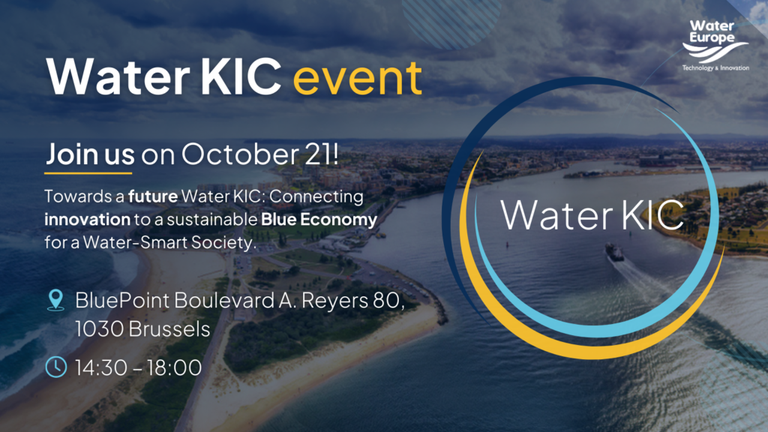
Water KIC event
Water Europe will host once again a raising awareness event on the future Knowledge and Innovation Commmunity (KIC) dedicated to the water, marine and maritime sectors. The event will bring together members from the research community, business, ...
Water Europe will host once again a raising awareness event on the future Knowledge and Innovation Commmunity (KIC) dedicated to the water, marine and maritime sectors. The event will bring together members from the research community, business, education, and key institutions from the European Commission. The event will also offer the opportunity to stakeholders interested in the KIC to pitch their expertise. It will therefore be an ideal occasion to foster collaborations.
